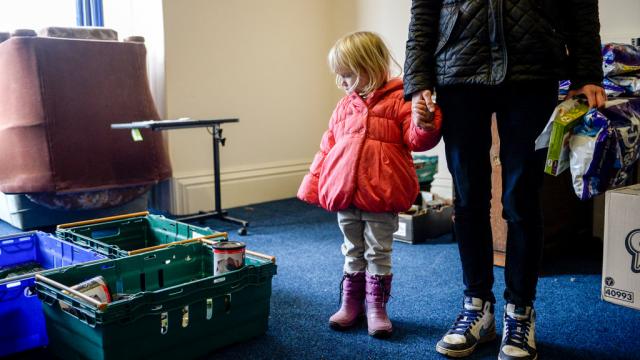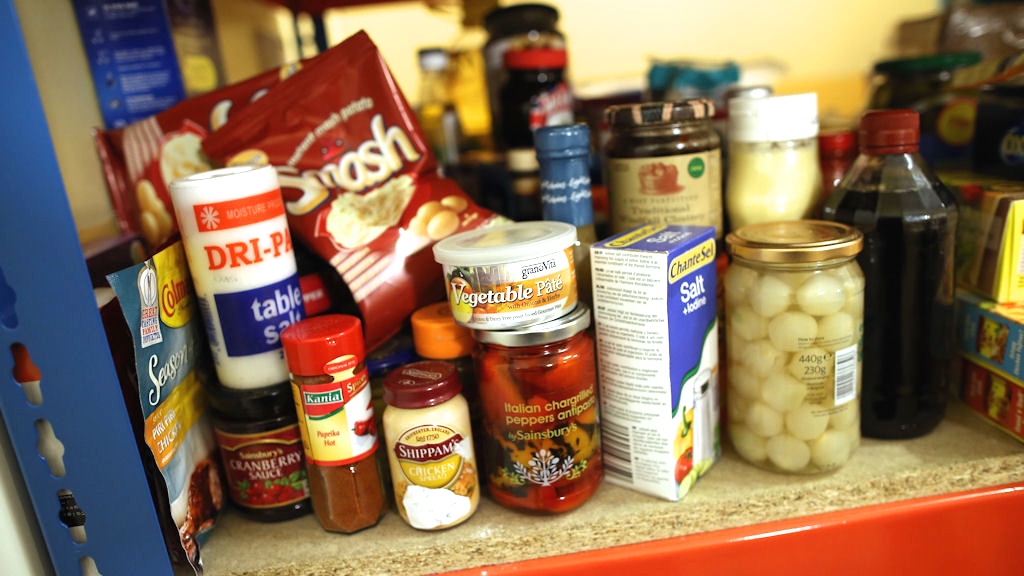
The reason there are so many hungry families in Britain who are relying on food banks is because “poor people don’t know how to cook.” This shocking remark was made by Baroness Jenkin. The Conservative peer spoke the words at the recent launch of a report on the U.K.’s hungry poor.
Baroness Jenkins took part in the parliamentary inquiry that helped produce the report. But her controversial comments dwarfed the launch of the government’s first comprehensive study of food poverty in Britain, sparking a wave of anger and resentment across the U.K. and leaving the Baroness with little other option than to humbly apologize.
As Occupy.com reported last month, long before the "poor people can’t cook" scandal emerged, food poverty has been on a sharp increase in the U.K. With food poverty steeply rising, the Red Cross has been called in to hand out food to Britain’s starving families for the first time since the Second World War.
Feeding Britain
The inquiry that produced the Feeding Britain report was set up by the All-Party Parliamentary Group on Hunger and Food Poverty in April. It was designed to understand the “extent and geographical spread of hunger and food poverty” in the U.K. It was also aimed at understanding the “extent, nature and organisation of emergency food assistance schemes in this country,” and to “investigate the underlying causes of hunger and food poverty” in the country.
According to the food poverty inquiry, benefit-related problems were the “single biggest reason” given for food bank referrals by almost every food bank that presented evidence to the inquiry.
The inquiry deems the delays in receiving benefits were the key reason many individuals and families have been turning to food banks in recent years. As it currently stands, the average number of days between an application being made and a decision being given about the claim is 16 days – too long for many to survive without money.
“We believe the Government must urgently reform the benefits system so it is able to deliver payments quickly within five working days,” states the report.
According to figures from the Department for Work & Pensions, in the previous year nearly a million people lost at least one month’s worth of benefits for failing to do enough to look for work. The statistic is the highest since a new regime was introduced in 2012 to penalize people who are seen as not doing enough to find a job.
Since the sanctions for job seeker claimants were toughened, anyone deemed as breaching the rules has been left without job seekers allowance for a minimum of four weeks.
Meanwhile, Jobcentres – government offices set up in most towns in the U.K. to display information and advice about available jobs and unemployment benefits – are operating a zero-tolerance approach to claimants who fail to demonstrate they are actively seeking employment.
The Office for National Statistics has revealed that other than Spain, Greece and Portugal, the U.K. spent less on welfare protection per head of population than any other Western European economy.
Wages are not Keeping Pace with the Rising Price of Food
The Feeding Britain report found that too many individuals earning the National Minimum Wage are relying on food banks for help. Part of this is because inflation has been outstripping wages in the U.K. for quite some time. The correlation between inflation and food poverty is particularly harsh; official statistics released in July showed that during the past year, average earnings in Britain increased by just 0.3 percent, the lowest in five years. This contrasts starkly with consumer price inflation which, amid higher food prices, rose to 1.9 percent.
With inflation and food prices outstripping wages, the U.K.’s largest union, Unite. is fighting to have the living wage replace the minimum wage. The plan, however, seems a long way off, as I reported in my previous piece that almost 5.3 million people in the U.K. are currently paid less than the living wage.
Food Deserts: Poorer People Pay a "Poverty Premium"
It has also been noted that those living in deprived areas pay a "poverty premium" because there is less competition among food retailers for customers, so prices remain higher in poorer areas. This suggestion was made in a report drawn from the work of the charities Oxfam and Church Action, titled "Walking the Breadline: The Scandal of Food Poverty in 21st Century Britain".
The report found that 85 percent of households that have a weekly income of £150 or less do not own a car. The arrival and rise of "out of town" supermarkets and shopping developments have led to more independent "in town" retailers being unable to compete and shutting down. This has left many poor households living in so-called “food deserts," without a car and unable to reach these supermarkets to buy comparatively more affordable and healthy food.
The children’s charity group Save the Children estimated that low-income households spend an average £1,300 a year – proportionately higher than average or high income families – for food, fuel, finance and other services and goods.
Children Turning up to School Hungry
The Feeding Britain report also showed that a staggering four out of five teachers in the U.K. are reporting that some of their students are arriving at school hungry. Furthermore, one survey compiled in London found that 61% of teachers had provided food to their children at their own expense.
In households that are unable to provide their children an adequate diet, 93% have an adult who willingly “skimps” on their own meals to help feed their children.
“Half a million children are not adequately fed in the U.K. today, not as a result of negligence but due to a lack of money,” said the report.
Yet as charities and reports argue that the rise in food bank reliance is because so many people are destitute with not enough money, Baroness Jenkin, wife of Conservative Member of Parliament Bernard Jenkin, believes the problems derive from poor people’s alleged collective inability to cook and their penchant for eating sugary cereals instead of porridge.
“We have lost our cooking skills,” said Jenkin. “Poor people don’t know how to cook. I had a large bowl of porridge today, which cost 4 pence. A bowl of sugary cereal will cost you 25 pence.”
The remark ignited controversy and debate. Occupy.com spoke to Craig Barrows, a commis chef in the north of England, who said: “It was a stupid and ill-thought of comment that completely diverts from the issue."
"I personally know poor people who can cook really well. Likewise I know well-off people who are useless at cooking,” Barrows said. “I learned to cook when I was unemployed and surviving on job seekers benefits because I had the time to experiment with cooking.”
But the commis chef added that this isn’t a debate about who can and cannot cook. It’s a debate about how, due to welfare cutbacks, rising food prices and unlivable wages, a growing number of people in Britain are having to resort to food banks as a means of staving off hunger.
3 WAYS TO SHOW YOUR SUPPORT
- Log in to post comments












